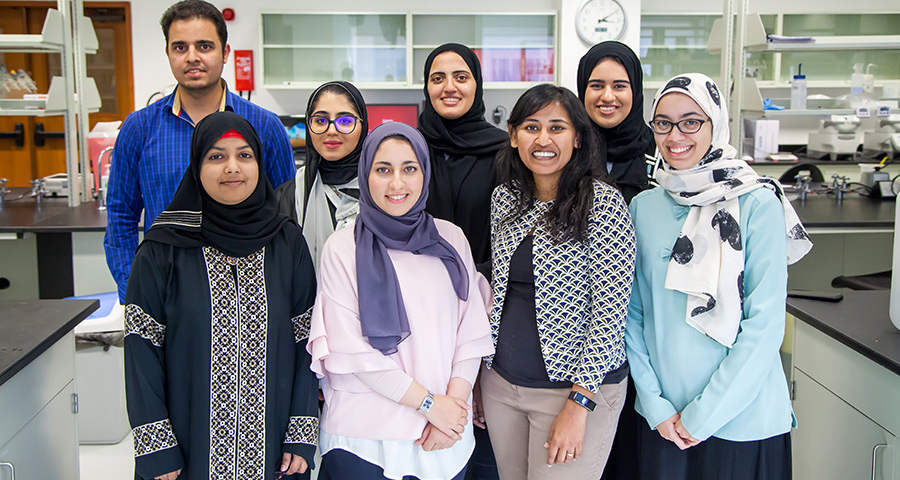
CMU-Q students develop eco-wise approach for oil and gas
Student researchers use synthetic biology to reduce need for harmful biocides
A team of students at Carnegie Mellon University in Qatar (CMU-Q) is developing a novel method to lessen the environmental impact of off-shore oil extraction. They will present their findings in November at the iGEM Competition at the Massachusetts Institute of Technology (MIT).
The team is looking at the question of unnecessary biocide use by off-shore oil extractors. The problem lies with the growth of biofilms, which corrode the pipes. To prevent this corrosion, the oil and gas industry flushes biocides at regular intervals to kill the biofilm. The chemicals in the biocides, however, ultimately end up in the sea water and pose a threat to the delicate marine ecosystem.
The interdisciplinary student team of Yasmin Abdelaal, Albandari Al-Khater, Dina Nayel Al Tarawneh, Najlaa Al-Thani, Aisha Fakhroo, Al-Reem Johar, Saad Rasool, Kawthar Alsadat Jafarian and Fatema Abdul Salik is developing an easy, quick way for the oil industry to test if there is a biofilm build-up. A rapid and reliable test could lead to the oil industry using biocides only when necessary rather than as a regular, preventative measure, which would in turn reduce negative impact on the marine ecosystem.
“This project is exciting because it has a practical application that can make a big impact on the health of the ecosystem in the waters around Qatar. The students are a motivated, hard-working group, and we wish them the best of luck at the MIT competition,” said Annette Vincent, assistant teaching professor of biological sciences and the team’s faculty advisor at CMU-Q.
“The team also has Cheryl Telmer’s advice and guidance, which is invaluable as they prepare for the competition,” added Vincent. Telmer is a research biologist at Carnegie Mellon’s Pittsburgh campus who has coached CMU teams at the iGEM competition in the past.
The method of testing the pipelines involves creating genetically engineered machines, which are harmless bacteria that have been modified to perform a certain task. The team is genetically engineering sensors that can detect the environmental conditions that are optimal for biofilm growth and fluoresce if they are met.
The International Genetically Engineered Machine (iGEM) Foundation that hosts the annual competition is an independent, non-profit organization dedicated to education and competition, the advancement of synthetic biology, and the development of an open community and collaboration.
